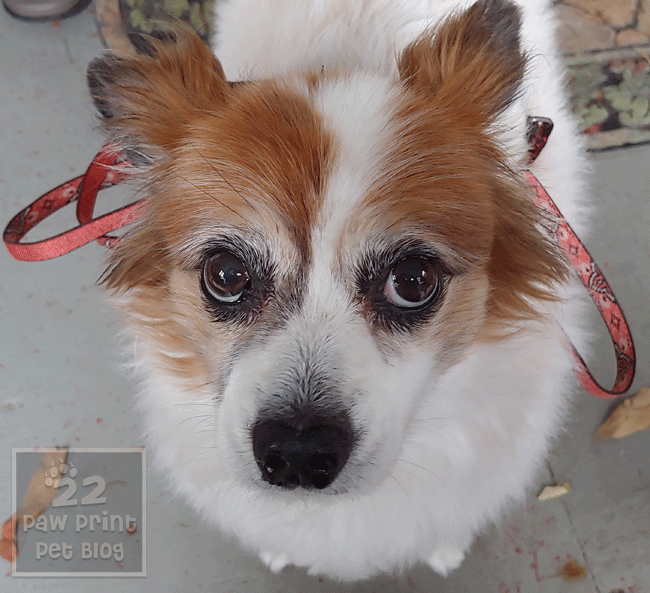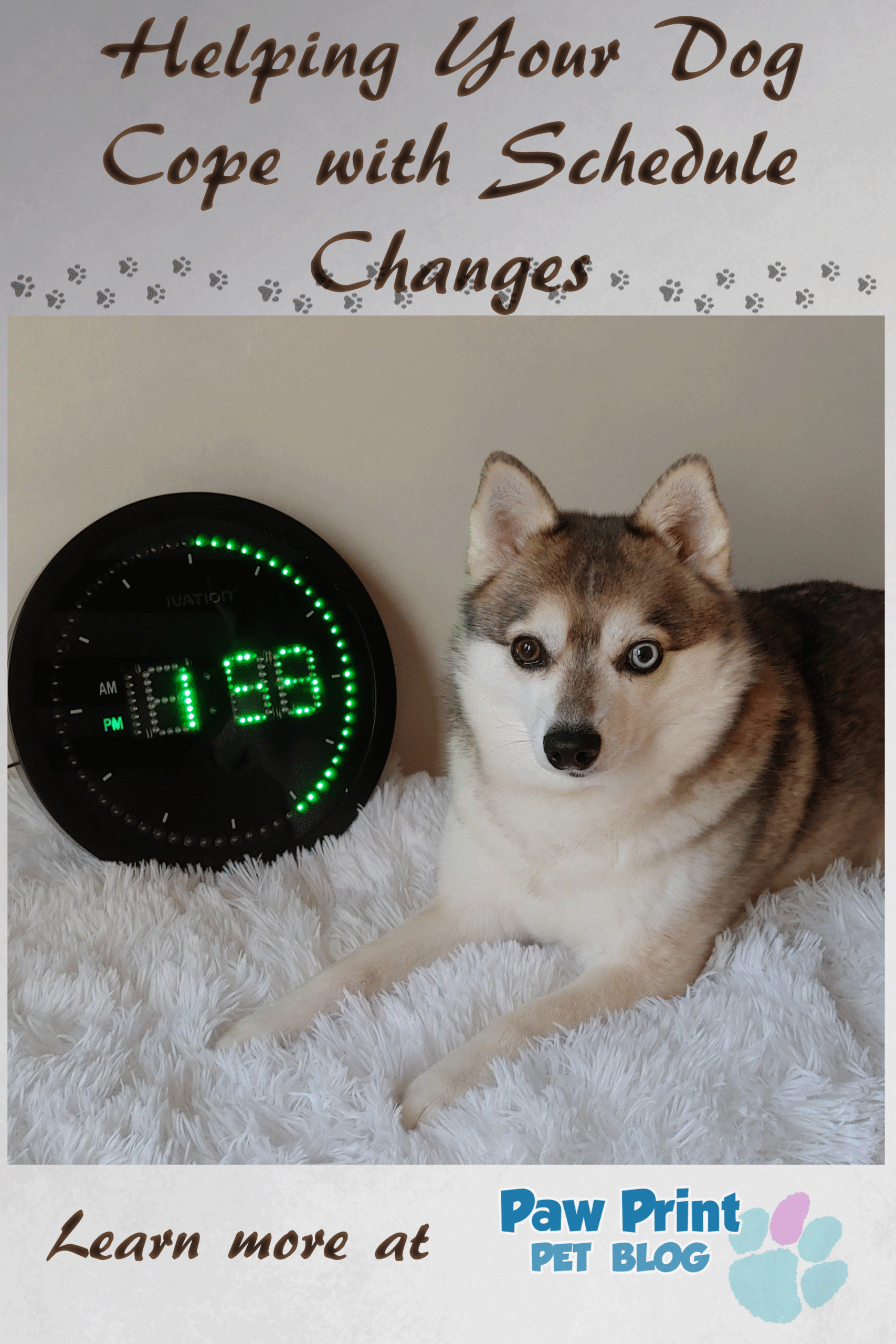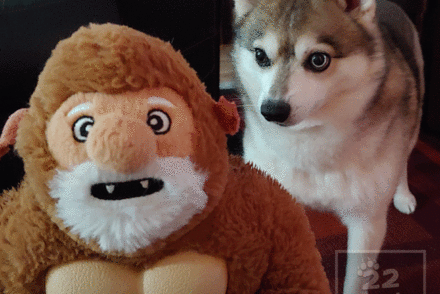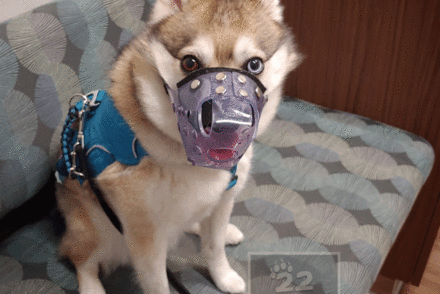Dogs don’t understand daylight savings time. That fact has been made abundantly clear to me throughout the past week. When daylight savings time ended last weekend, I suddenly found myself at the mercy of my dogs’ inner clocks. Adjusting to schedule changes, whether they involve an hour’s difference or a completely new routine, can be hard on your dog!

How can I resist these faces!?
Up until rather recently, both of my dogs were on medication. Kitsune for IVDD (check out the latest update on his recovery here), and Fenrir for pancreatitis. When it rains it pours, or so “they” say. I had to give the pups their meds at certain intervals, which meant that their food (and medication) schedule was a bit stricter than what we’re normally used to. Once Kit and Fen were both off their medications (yay!), they, of course, continued to demand their meals at the times they were used to. That wasn’t too much of a problem. At least not until daylight savings time ended last weekend. What was once 8 am was now 7 am, and Kit has been waking me up around 6, just for good measure.
Post Contents:
Luckily Dogs are Pretty Adaptable Creatures
Most of the time, with a bit of help from their humans, dogs can take changes to their schedule in stride. Hey, it’s not like they have to worry about things like getting to work on time! Usually, the worst parts of schedule changes, for a dog, are things like getting fed “late” and not getting bathroom breaks at the times they are used to. Thankfully, there are some steps we can take to help our furry friends adjust to changes in their schedules.
Take Things Slow
To help Kit and Fen adjust to their slightly altered schedule recently, I decided to take things slow. Rather than making them wait an hour later for their meals, I started off by only changing their feeding time (from their perspective) by half an hour. I did the same with their walk and bathroom schedules. This same technique can work for other types of schedule changes as well. For example, if you’re starting a new job and need your dogs to get used to you being gone all day, start off (if you can) by leaving them home alone for a short time. Increase that amount of time a little at a time. In my experience, this tip really helps dogs to adjust more slowly over time. However, it might not always be possible to do this if you experience a sudden or unexpected change to your schedule.
Lots of Exercise!
A well exercised (both mentally and physically) dog is a more relaxed dog. Even when your schedule gets busy, remember to take time out of your day to play with your pup. Cater to your dog’s individual needs as far as exercise is concerned. For example, my senior dog, Kitsune, still has a lot of restrictions we have to follow when it comes to exercise thanks to his IVDD. But he’s a super smart dog! I may not, currently, be able to physically exercise him as much as I’d like. Mental stimulation can be just as engaging to a dog as physical exercise! So challenge those pups appropriately, body and mind!

Relaxing Settings
Help keep your dog relaxed during potentially stressful times. For example, use a crate to help keep your dog calm when you leave the house if he/she is already crate trained. If not, set aside an area of your house where your dog can relax unmolested. Keep their area calm, dark, and quiet. Or, perhaps, play some calming music or leave on the TV if that helps your dog to relax.
Prevent Bathroom Stress
If your dog is used to a specific bathroom break schedule, try to adjust this slowly. If you cannot, make sure you still give your dog plenty of bathroom breaks. Consider using potty pads if you’ll be gone for long periods of time, or during your dogs normal bathroom times. Or, better yet, hire a dog walker or family member/friend to help you take your dog out regularly until they have more time to adjust to their new schedule. Don’t freak out if your dog has an accident or two, especially if you’ve just changed up their schedule. Just clean things up and move on. Fido will adjust in time.
Patience & Time
Most importantly, dogs just need some time to adapt and get used to their new schedules. It usually doesn’t take dogs too long to adapt, depending on the dog. Be patient and kind and remember that your dog, unlike a human, doesn’t understand why their lives have changed. Depending on the dog and how drastic the schedule change was, expect your dog to take anywhere from a few days to a few months to fully adjust to their new normal.
No matter how busy your schedule gets, make sure to set aside some time to spend with your dog. Whether you’re playing with them, visiting the local park, or just snuggling up on the couch, there’s no part of their day that your dog enjoys more than being with you!
Comment below! Have you ever had to help your dog deal with schedule changes? What are some things that seemed to help and how long did your dog take to fully adjust? As for Kit and Fen, getting fed an hour “later” is hardly a massive schedule change. Although, if you ask Kit, it seems to be a pretty huge deal. Luckily I’ve been taking things slow and I have no doubts that in no time they’ll be accustomed to their slightly altered schedules. And I’ll be able to sleep past 6am again!






No Comments